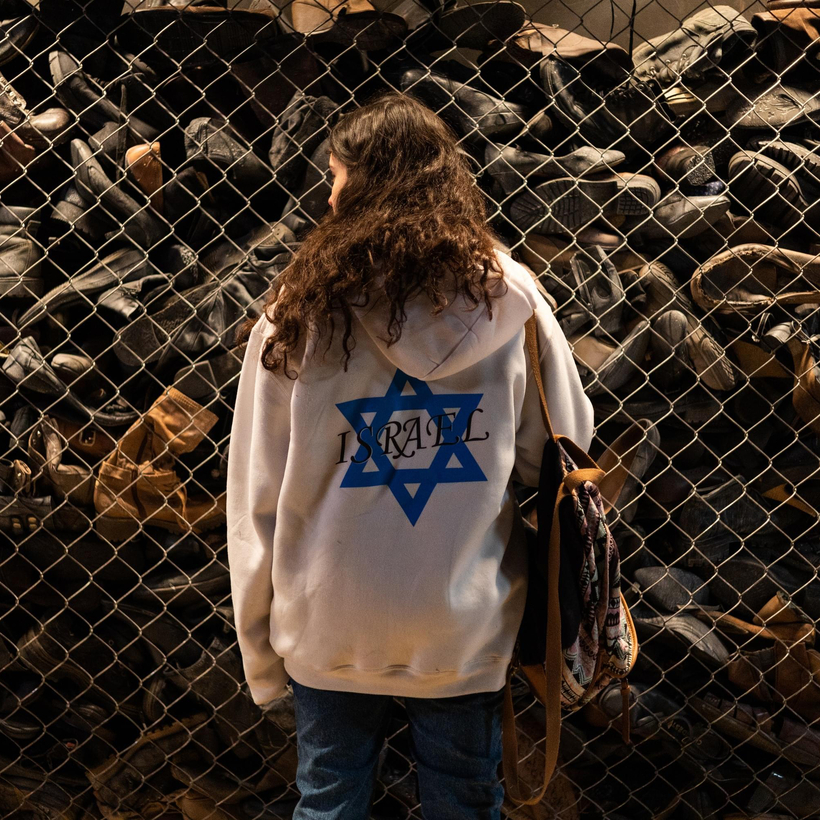Not many films are shaped both by John Hughes’s teen movies and Claude Lanzmann’s nine-and-a-half-hour Holocaust documentary, Shoah, yet those are the key influences on filmmaker Asaf Saban’s latest feature, Delegation.
Saban makes use of both the coming-of-age and road-trip film genres in order to enter what he calls “that minefield.” Only, for Saban, that minefield is not just the troubled terrain of adolescence but also the literal killing fields of Majdanek, Treblinka, and Auschwitz-Birkenau. “I didn’t want to answer why the educational system sends them there,” says Saban.

Instead, he wanted “to put in front the most delicate inner life of a teenager and not the most dramatic story in history.” In this way, Saban, who lives and works in Tel Aviv, just 90 minutes away from the war in Gaza, flips the script on Jesse Eisenberg’s recent A Real Pain, in which the Holocaust takes center stage.
“I live in a reality where people are getting used to atrocities and horrible things are happening,” Saban says. “That dehumanization is something we really need to fight against. Art and cinema should raise question marks where everybody is using exclamation points.”
Delegation follows a group of Israeli high-schoolers on what is known in Hebrew as “the Journey,” the class trip to the Nazi death camps that Jewish Israeli seniors take. “Growing up in Israel, that we live on an island is a state of mind,” Saban says. “Going abroad with your classmates holds a great deal of excitement. On the other hand, you’re on a national mission. You are, in a sense, kind of a pilgrim to a sacred site. It’s a very strange experience.”
Despite its impossibly dark setting, the film has a light touch, which it establishes from the very beginning when the students’ flagpoles fall off a luggage cart and get left behind in Israel. As a result, when the teens arrive in Poland, they wind up having to use broomsticks to hold up Israeli flags as they march through what a guide tells them is “one of the largest Jewish cemeteries in the world.”
One of the teens has brought his survivor grandfather, Yosef, along on the trip so that he can share a firsthand account of the Holocaust. And yet, Yosef is not able to discuss his painful past, instead going off on tangents about his happy, pre-war childhood memories, much to the frustration of the trip leader. “The teacher asks him to deliver his message better,” Saban says. “This is also a message from my side to the audience: I’m not going to take you through this trauma roller coaster that maybe you expect to get in other films. I resist the fact that Holocaust memory becomes a commodity.”
Meanwhile, Yosef’s grandson, Frisch, is depressed, though not because of his surroundings but because he feels socially ostracized by his classmates and because the girl he is infatuated with is in love with his best friend. Feeling hopelessly dejected, Frisch chooses to purposely miss the tour bus and winds up instead hitchhiking with an old Polish man, who creates a Holocaust-commemoration ceremony in his village just to honor Frisch. But when the townspeople gesture that Frisch should participate in the ceremony and say a prayer, the secular Frisch is speechless.
The incident was inspired, like much of the film, in part by Saban’s own experiences. Only the real incident happened in Fiji. Walking around the island solo, Saban heard live gospel music coming from inside a church and sneaked inside to see the band. “Someone asked me politely where I’m from,” he says, “and a few minutes later I found myself onstage and there was a queue of people waiting to get a blessing from the guy from the Holy Land. You understand that you carry some kind of mission and need to perform.”

While Saban completed Delegation before October 7, 2023—or B.C., as he refers to it—audience reactions to certain scenes have varied based on when and where the film is screened. When I saw the film at the New York Jewish Film Festival at Lincoln Center back in January 2024, just three months after the Hamas attacks, the audience gasped when one student says that the Holocaust will never happen again now that the Jews have their own state.
But Saban says that when he premiered the film in Israel just six months earlier, in July of 2023 at the Jerusalem Film Festival, that same line provoked the audience to burst out laughing. Why? Because in Israel, that line is said so often it is a trope. “I can tell you that my own perspective when I wrote the script was ironic,” Saban says.
And yet, when he showed the film to evacuees from an Israeli town on the border with Lebanon just two months after October 7, that audience laughed as well, only now they were laughing at their own naïveté.
“That shift is very interesting for me,” says Saban. “My identity is something which is not static. It is still being written. It sounds very mystical in theory, but I realize that potency.... What kind of message do you choose to deliver to the next generation? We have a great responsibility to which story we choose to tell, partly because we are still in the story.”
Delegation is now streaming on Amazon, Apple TV+, YouTube, Google Play, and Fandango at Home
Johanna Berkman is a Writer at Large at AIR MAIL. You can read her story about Hamas in America here


